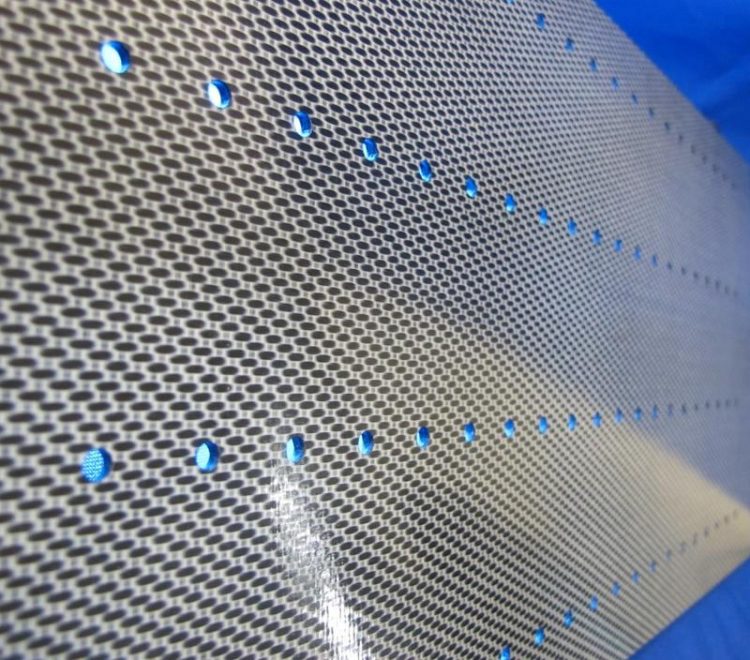Precise laser drilling of CFRP components in large quantities

Laser-drilled holes in an aircraft component made of CFRP. LZH
Composites, such as carbon fiber reinforced plastics (CFRP), have a high potential for lightweight construction and are therefore already now widely used in aviation. These materials, however, have extraordinary properties, such as a low weight and high stability at the same time, but processing composites is quite complex. Here, mechanical processes lead to high tool wear and thus to quality problems.
Laser radiation instead of carbide drills
For aviation in particular, the drilling of CFRP has an enormous market potential. The aircraft manufacturers produce increasing quantities with a high number of drilled holes for riveted and screwed joints. This requires reliable, fast and cost-efficient processes to withstand international competition. For this purpose, laser beam drilling is an ideal alternative to conventional processes.
In the project „Laser Beam Drilling of Composites for Applications in Aviation” (LABOKOMP), the partners focus on the development of customized processing strategies using a new, high pulse laser beam source.
To design a process that suits industrial needs, a tailor-made system, handling and monitoring technique shall finally be made available to the users. Only thus, the highly precise and dynamic handling and processing of high-quality serial components can be achieved.
One clamping system for all component variants
Within the scope of the project, the small and medium-sized enterprises (SMEs) INVENT GmbH and KMS Technology Center GmbH as well as the large enterprises TRUMPF Laser GmbH and Premium AEROTEC GmbH develop automated clamping and positioning systems that include, among other things, an integrated vibration recognition and damping.
Unlike conventional separation processes, a single clamping system can be used for all component variants here. To provide a comprehensive entire process, the supply and exhaust of process gases and emissions as well as the cooling of the workpieces are optimized, too.
A tailor-made laser process control for more efficiency
Investigations and material tests with the aim to minimize the thermal stress on laser-drilled CFRP components, and at the same time increasing the efficiency through a tailor-made process control – these are the work priorities of the LZH experts in the Composites Group of the Production and Systems Department. Apart from the manufacturing of small components in large quantities, the novel process strategy shall be transferred to the assembly of large structures, too, in the future.
This project is sponsored by the German Federal Ministry of Education and Research (BMBF) within the scope of the „KMU-innovativ: Photonik“ initiative for a duration of three years.
Media Contact
More Information:
http://www.lzh.de/All latest news from the category: Materials Sciences
Materials management deals with the research, development, manufacturing and processing of raw and industrial materials. Key aspects here are biological and medical issues, which play an increasingly important role in this field.
innovations-report offers in-depth articles related to the development and application of materials and the structure and properties of new materials.
Newest articles

NASA: Mystery of life’s handedness deepens
The mystery of why life uses molecules with specific orientations has deepened with a NASA-funded discovery that RNA — a key molecule thought to have potentially held the instructions for…

What are the effects of historic lithium mining on water quality?
Study reveals low levels of common contaminants but high levels of other elements in waters associated with an abandoned lithium mine. Lithium ore and mining waste from a historic lithium…

Quantum-inspired design boosts efficiency of heat-to-electricity conversion
Rice engineers take unconventional route to improving thermophotovoltaic systems. Researchers at Rice University have found a new way to improve a key element of thermophotovoltaic (TPV) systems, which convert heat…



